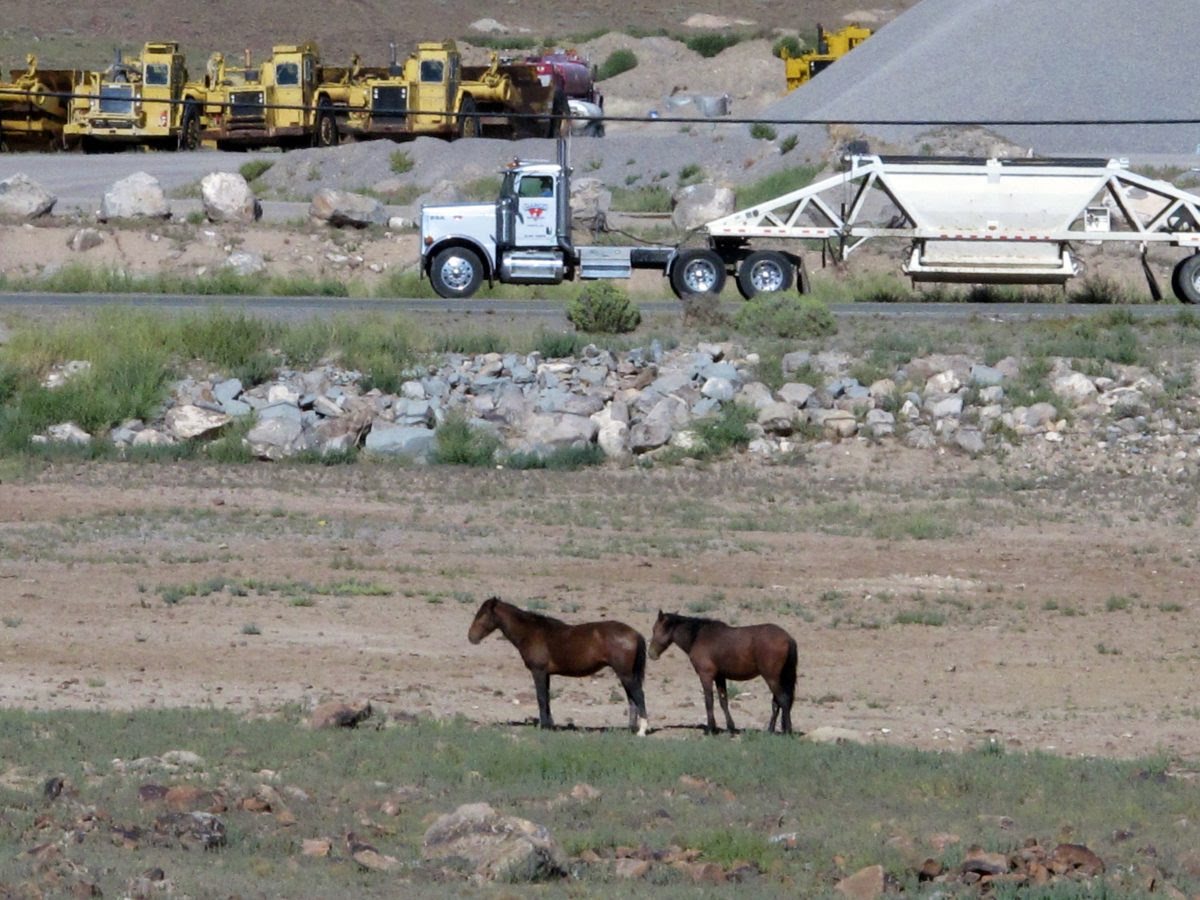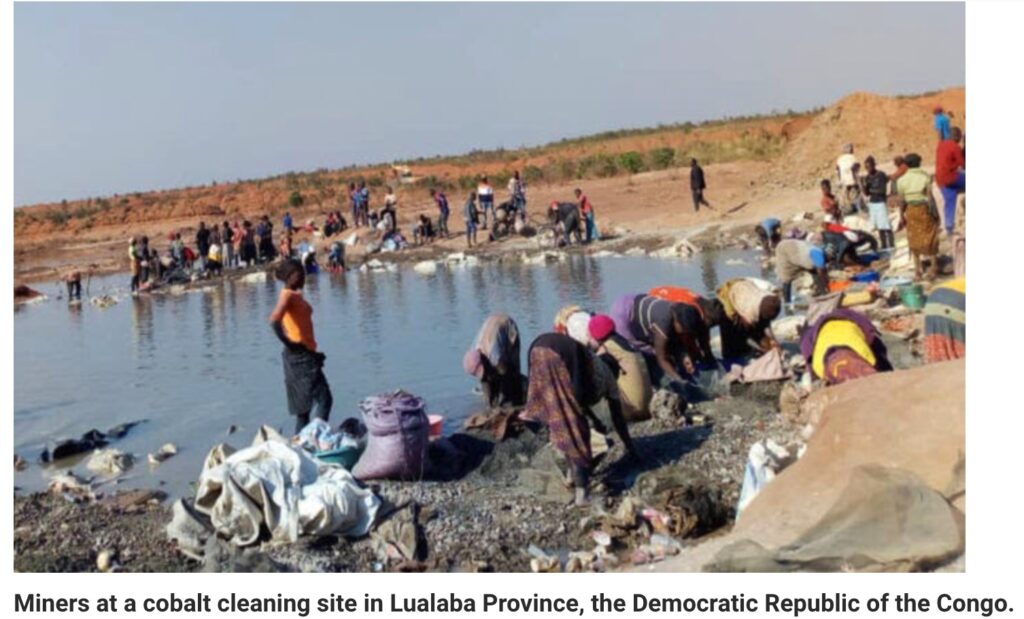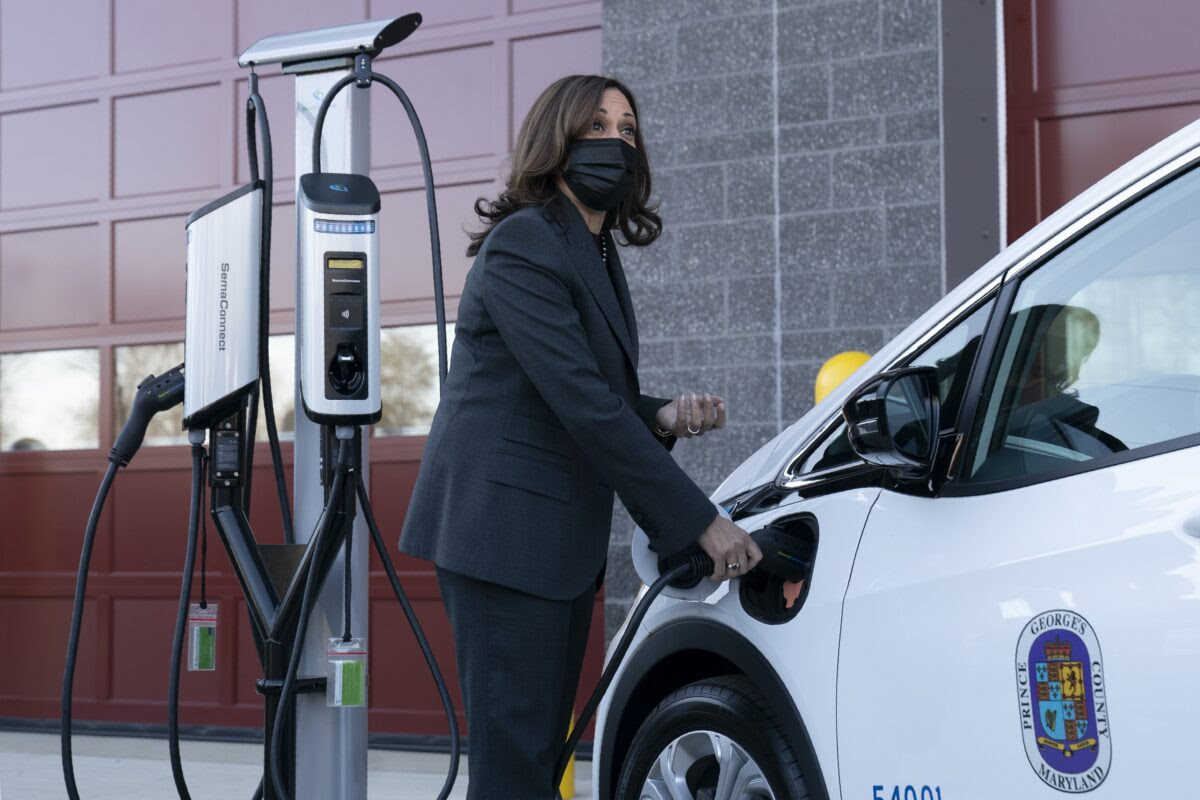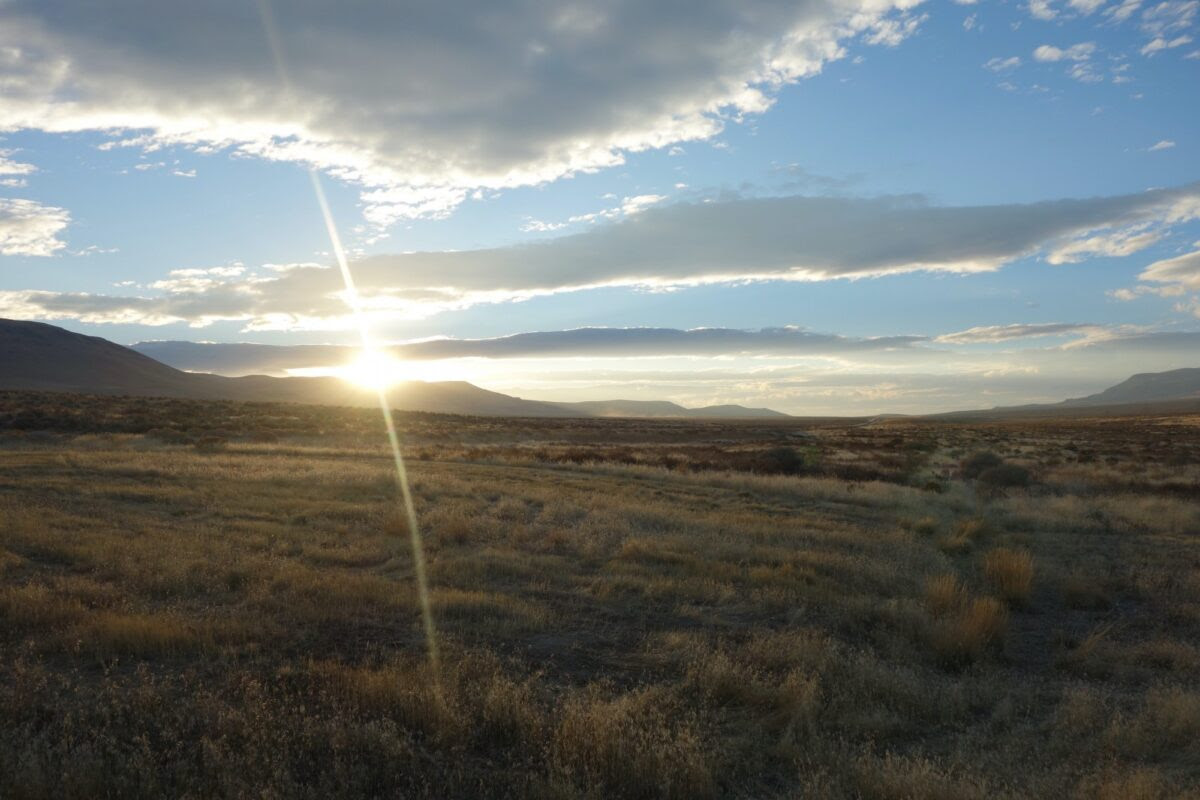In Chile’s Salar de Atacama, locals watch helplessly as their ancestral lands wither and die, their precious water resources evaporating in briny salars.
In the Democratic Republic of Congo, hope for a better life dissolves as well-funded Ugandan-led extremist groups force children as young as 6 to work in cobalt mines.
Closer to home, Nevada’s Fort McDermitt Tribe and local ranchers fight to protect a sacred burial site and agricultural lands set to be sacrificed by Lithium Nevada, a mining company, in the coming days.
Meanwhile, in California and other states, politicians such as Gov. Gavin Newsom (D-Calif.) pat themselves on the back for their “aggressive” environmental stance and boast that their gas-powered vehicle bans are leading “the revolution towards our zero-emission transportation future.”
The Hidden Costs
According to politicians like Newsom and President Joe Biden, electric vehicles (EV) are “zero-emission” because they use lithium-ion batteries—consisting of lithium, cobalt, graphite, and other materials—instead of gas.
Thus, starting in 2035, California will ban gas-powered vehicle sales, while several other states plan to follow suit, citing that as a goal and “critical milestone in our climate fight,” on Twitter.
Additionally, according to a statement from Biden, banning gas-powered vehicles will “save consumers money, cut pollution, boost public health, advance environmental justice, and tackle the climate crisis.”
John Hadder, director of the Great Basin Resource Watch, disagrees, pointing out to The Epoch Times that “industrial” nations might benefit from the transition to EVs, but it’s at the expense of others.
“This expansion of [lithium] mining will have immediate consequences for front-line communities that are taking the ‘hit.’”
For example, Copiapó, the capital of Chile’s Atacama region, is the location of one of the world’s largest known lithium reserves.
“We used to have a river before, that now doesn’t exist. There isn’t a drop of water,” Elena Rivera Cardoso, president of the Indigenous Colla community of the Copiapó commune, told the National Resources Defense Council (NRDC).
She added that all of Chile’s water is disappearing because of the local lithium mine.
“In all of Chile, there are rivers and lakes that have disappeared—all because a company has a lot more right to water than we do as human beings or citizens of Chile.”
 Brine pools from a lithium mine that belongs to U.S.-based Albemarle Corp., are seen on the Atacama salt flat in the Atacama desert, Chile, on Aug. 16, 2018. (Ivan Alvarado/Reuters)
Brine pools from a lithium mine that belongs to U.S.-based Albemarle Corp., are seen on the Atacama salt flat in the Atacama desert, Chile, on Aug. 16, 2018. (Ivan Alvarado/Reuters)
In collaboration with Cardosa’s statement, the Institute for Energy Research reports that 65 percent of the area’s limited water resources are consumed by mining activities.
That’s displacing indigenous communities who have called Atacama home for more than 6,000 years, because farmers and ranchers have cracked, dry soil, and no choice but to abandon their ancestral settlements, according to the U.N. Conference on Trade and Development (UNCTAD).
Mine Proposed in Northern Nevada
Saying goodbye to an ancestral homeland as a local lithium mine destroys it is something the communities in northern Nevada are fighting to avoid.
“The agricultural communities on either side of the pass are likely to be changed forever,” Hadder told The Epoch Times. “The [Thacker Pass mine] could affect their ability to farm and ranch in the area. The air quality will decrease … and increased water scarcity is likely.”
Hadder pointed out that the Quinn-Production well in Orovada Subarea Hydrographic Basin, which supplies water to Thacker Pass, is already heavily overallocated.
But, lacking water isn’t the only concern locals have with Thacker Pass, he says.
“[The National Congress of American Indians] are deeply concerned that the mine will threaten the community with man-camps and large labor forces,” Hadder said. “The introduction of man-camps near reservations has been shown to correlate strongly with an increase in sexual assaults, domestic violence, and sex trafficking.”
That concern has merit. In 2014, the United Nations found that “extractive industries,” aka mines, led to increased instances of sexual harassment, violence, rape, and assault, due to “man-camps” or workers at the mine.
 Tesla Motors Inc. plans to build a 6,500-worker “gigafactory” to mass produce cheaper lithium batteries for its next line of more-affordable electric cars near the center. (AP Photo/Scott Sonner)
Tesla Motors Inc. plans to build a 6,500-worker “gigafactory” to mass produce cheaper lithium batteries for its next line of more-affordable electric cars near the center. (AP Photo/Scott Sonner)
In 2019, the U.S. Bureau of Justice Statistics published a study validating the above information. It found a 70 percent increase in violent crime “corresponding to the growth of extractive industry in the areas, with no such increase observed in adjacent counties without extractive industries.”
Experience of Congolese Miners
That’s something the people of the Democratic Republic of Congo (DRC) know from first-hand experience.
In its 2022 report, the U.S. Geological Survey reported that in 2021, more than 70 percent of the global cobalt production came from the DRC and that southern Congo sits atop an estimated 3.5 million metric tons—almost half—of the world’s known supply.
It’s also one of the world’s poorest countries, according to the nonpartisan Wilson Center, and plagued by humanitarian crises, some of which are directly caused by mining.
 A child walks past a truck carrying rocks extracted from a cobalt mine at a copper quarry and cobalt pit in Lubumbashi, Democratic Republic of the Congo, on May 23, 2016. (Junior Kannah/AFP via Getty Images)
A child walks past a truck carrying rocks extracted from a cobalt mine at a copper quarry and cobalt pit in Lubumbashi, Democratic Republic of the Congo, on May 23, 2016. (Junior Kannah/AFP via Getty Images)
In December 2021, researchers at Northwestern University conducted an environmental life cycle assessment on extracting raw materials needed for EVs and published their paper in One Earth’s Journal.
They found cobalt mining was associated with increased violence, physical and mental health challenges, substance abuse, and food and water insecurity, among other issues. They further noted that community members lost communal land, farmland, and homes, which miners dug up to extract cobalt.
“You might think of mining as just digging something up,” said Sera L. Young, an associate professor of anthropology at Northwestern University. “But they are not digging on vacant land. Homelands are dug up. People are literally digging holes in their living room floors. The repercussions of mining can touch almost every aspect of life.”
That “every aspect of life” includes children. In the DRC, an estimated 40,000 children are working in the mines under slave labor conditions—some as young as 6. Initially, there was hope that DRC President Felix Tschisekedi would curb the abuses, but now those hopes are dwindling.
In her address before the U.S. Congress on July 14, Crisis and Conflict Director for Human Rights Watch Ida Sawyer stated that “child labor and other serious human rights abuses in the mining sector remain widespread, and these challenges only become harder to address amidst rampant corruption.”
“The Allied Democratic Forces (ADF), a Ugandan-led armed Islamist group with ties to the Islamic State (ISIS) … as well as their backers among the Congolese political and military elite, control lucrative mineral resources, land, and taxation rackets.”
The Wilson Center reports that there are an estimated 255,000 Congolese miners laboring for cobalt, primarily using their hands.
“As global demand for Congolese mineral resources increases, so do the associated dangers that raise red flags for Congolese miners’ human rights,” it said.
And human rights violations aren’t the only concern with cobalt mining. Wilson Center states: “The extraction of DRC mineral resources includes cutting down trees and building roads, negatively impacting the environment and biodiversity … Cobalt mining operations generate incredibly high carbon dioxide and nitrogen dioxide emissions and substantial electricity consumption. These emissions contribute to the fact that Africa produces five percent of carbon dioxide emissions globally.”
 California Gov. Gavin Newsom speaks in Los Angeles, on Sept. 29, 2021. (John Fredricks/The Epoch Times)
California Gov. Gavin Newsom speaks in Los Angeles, on Sept. 29, 2021. (John Fredricks/The Epoch Times)
Meanwhile, in California, Newsom extolled his state’s move away from fossil fuels.
“This plan’s yearly targets—35 percent ZEV sales by 2026, 68 percent by 2030, and 100 percent by 2035—provide our roadmap to reducing dangerous carbon emissions and moving away from fossil fuels. That’s 915 million oil barrels’ worth of emissions that won’t pollute our communities.”’
 Katie Spence covers energy and politics for The Epoch Times. Before starting her career as a journalist, Katie proudly served in the Air Force as an Airborne Operations Technician on JSTARS. She obtained her degree in Analytic Philosophy and a minor in Cognitive Studies from the University of Colorado. Katie’s writing has appeared on CNSNews.com, The Maverick Observer, The Motley Fool, First Quarter Finance, The Cheat Sheet, and Investing.com. Email her at katie.spence@epochtimes.us
Katie Spence covers energy and politics for The Epoch Times. Before starting her career as a journalist, Katie proudly served in the Air Force as an Airborne Operations Technician on JSTARS. She obtained her degree in Analytic Philosophy and a minor in Cognitive Studies from the University of Colorado. Katie’s writing has appeared on CNSNews.com, The Maverick Observer, The Motley Fool, First Quarter Finance, The Cheat Sheet, and Investing.com. Email her at katie.spence@epochtimes.us






Superb article:
Biden’s Evil Empire Must Be Defeated!
https://politicrossing.com/bidens-evil-empire-must-be-defeated/
“Democrats have no issues or results to run on. They are left with lies, name-calling, and transparent taxpayer funded bribes! After all, if you can’t win on issues, try demeaning half of Americans as “dangerous” extremists. Americans can’t let this work. Get mad. Get ready for the most important election of your life. Be a contagious conservative and let others know the truth about this administration. Take back America by voting for every Republican candidate willing to serve. Remember this important truth—If it’s not close, they can’t cheat!”
EV cars are a total disaster. They are hardly useful family vacations on the road. Their constant need for charging are a nuisance. People will come to hate these backward contraptions. Plus the initial cost is not affordable for the average car user.
Gasoline cars are not perfect but they are 100 times better than the EV cars. In my family we have a hybrid which appears to be a decent compromise. It has a gasoline engine that constantly recharges the battery, there is no hunting for a charging station and they cost 1/2 of the EV car.
When the Government gets involved in things like this….a disaster is happening before your eyes.
Low flow toilets are a plumber’s nightmare. House sewers are designed for a full flow flush.
Best I can tell, this blog is dead or dying.
Which blog, Will?
THIS blog, Jim…..would you not admit it’s much less active than the past few years? Toni shows up on occasions. What happened to Daichse (sp?)? Doyle is totally gone. We used to have a much more active give and take. We rarely get new posters and I think that’s because the registration process is not obvious.
OK. I’ll share that with my webmaster. There’s an ebb and flow to blogs. Keep ’em coming!
Well, Jim…it’s not the first time this has been mentioned. I know i’m a pain i the arse, but if not me, who? We are most definitely in the ebb state, since (as best I can tell) only Don and myself made any comments yesterday, the 20th. Everything on the front page are pings. Oh, I’ll “keep truckin” OK, but only out of respect for you…not this system as it really sucks.
We are kicking off the NEWSLETTER (finally!) on Sunday and hopefully that will make a difference. You mentioned that the old blog is now an archive of docs in this case, but it’s only partial and selective. Here’s a better one: http://www.postwtc.com/frame-pvf.html
Beautiful, Jim…thank you. Let Mathis dispute that, eh? New meme…MIMTOP (Mathis is more than one person)…maybe that’ll piss him off.